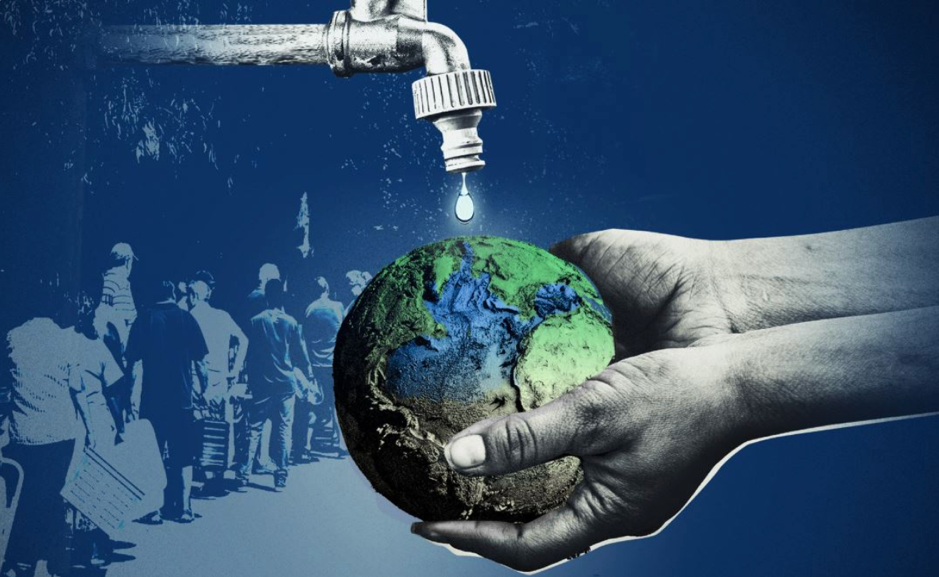
Consequences of water stress
In a previous writing, we reminder ourselves of the importance of water to life itself. It is amazing that humanity, all 7.7 billion of us, survive (or try to) on the 1% of water available that is fresh water. Given this is such a scarce public good, this realisation alone should be enough for all of humanity to hold it in the regard that it deserves. However, the reality is that this is not the case. Our global freshwater resources are depleting with each passing day.
The World Wildlife Fund state: “globally around 1.1 billion people have no access to water, while around 2.7 billion people face the issue of scarce water for at least one month of the year”.
As fresh water become scarcer, the effect will be widely felt. That should not surprise anyway as fresh water is involved in everything we do and drink and eat.
Lack of clean drinking water, as we said in the previous blog, makes up approximately 60 percent of your bodyweight. Accordingly, proper hydration is essential to your survival. Your body needs to consume a significant amount of water each day to function properly. This is because you constantly excrete water through sweat and urination, so your body needs to replenish the lost fluids. You won’t live long without consuming a healthy amount of water. It’s only possible to survive without water for a matter of days. You will be susceptible to the effects of dehydration even sooner, depending on certain factors including, age, weight, outside temperature, activity level etc.
Therefore, we could well imagine, lack of fresh water would lead to massive population migration, and in extreme cases where water isn’t consumed, death.
Food shortages - The shrinking water resources are gradually making it difficult for food production to keep up with increasing demand. This eventuality will also result in massive population migration.
Effect on human health – a reasonable adverse expectation if fresh water and food are scarce.
Energy Shortages – fresh water is involved in fossil fuel energy production. Failure to draw enough water will have an adverse impact on energy production. For example, in India, unable to draw enough water from the nearby Majalgaon dam, which had nearly run dry, the Parli Thermal Power Station in Maharashtra, (a coal-powered unit) was unable to run its cooling system and was forced to halt electricity production.
Effects on economic activity – water is involved in everything anybody manufactures or builds. Fresh water scarcity would impose limits on how much of anything could be produced.
Civil disruption – the word “fresh water” should mean life itself. If fresh water availability is at risk, humanity will move to locations where is it available. That mass population migration will result in people moving across borders and across continents. Will humanity build walls?
Imbalance of Nature - There are some serious consequences attached to Earth running out of the water. Groundwater depletion has caused the ground terrain to fall as the earth crust becomes lighter.
For the readers interest, we summarise countries that are facing varying degrees of water scarcity affecting their populations:
• Twelve out of the 17 most water-stressed countries are in the Middle East and North Africa. The region is hot and dry, so water supply is low to begin with, but growing demands have pushed countries further into extreme stress.
• India - the National Institution for Transforming India (NITI Aayog), a government research agency, declared that the country is “suffering from the worst water crisis in its history, and millions of lives and livelihoods are under threat.” Aqueduct’s findings put this crisis in context: India ranks 13th for overall water stress and has more than three times the population of the other 17 extremely highly stressed countries combined. Crop irrigation is the biggest culprit.
• It’s clear that even in countries with low overall water stress, communities may still be experiencing extremely stressed conditions. South Africa and the United States rank 48 and 71 on WRI’s list, respectively, yet the Western Cape and New Mexico experience extremely high stress levels.
• Brazil, the Cantareira water system that supplies water to more than 10 million people in the Sao Paulo metro area is almost 75% empty. The water shortage has compelled many companies to move their production elsewhere.
• Iran - the single largest lake of the Middle East, Lake Urmia has dried up.
• Australia and China are also no different as they too are facing their share of shrinking underground water reserves. This is having critical effects on agriculture.
There are ways in which we can all play are part in our everyday life to make a conscious effect to conserving water. environment4change will help education the global masses to change their lifestyle and consumption habits and also share ways in which we can all recycle wastewater. Obviously, effects to clean up local waterways will reduce pollution, which will be a great thing.
